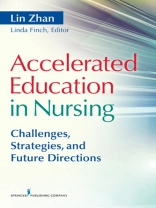‘As one of the first books examining the core issues of accelerated nursing education, this one offers valuable information on the challenges and successes of this educational model.’– Doody’s Medical Reviews
‘Accelerated degree programs provide evidence that creativity in nursing program design can facilitate learning experiences that assure competence in the profession while also taking advantage of the knowledge, skills, and experiences the learner brings to our profession. Lessons learned from accelerated nursing programs can be applied in all our programs and enrich the education of professional nursesÖ’
Geraldine Polly Bednash , Ph D, RN, FAAN
CEO, AACN
Over the last two decades, an unprecedented pool of nursing students-many with academic degrees and prior work experience-have entered accelerated programs. This is the first volume to examine core issues in accelerated nursing education, such as curriculum innovation, clinical immersion, recruitment and retention of students and faculty, and inter-professional education. It also addresses questions regarding:
- How accelerated nursing programs prepare graduates to meet changing health care needs
- Which curriculums and clinical models are best suited to accelerated education
- What teaching strategies and evidence-based practices ensure high quality results
Key Features:
- Discusses enrollment and admission at the BSN and MSN levels
- Explores curriculum innovation, new teaching methods, and start-up programs
- Analyzes student retention and progression, with remediation strategies
- Presents faculty recruitment, retention, and development successes
- Addresses issues concerning second degree and second career students
Daftar Isi
‘
Foreword
Preface
Acknowledgments
SECTION I: ACHIEVING EXCELLENCE IN ACCELERATED NURSING EDUCATION
1. Accelerated Nursing Education: An Overview2. Curriculum Innovation
3. Clinical Immersion as an Innovative Pedagogical Approach in Accelerated BSN Programs and Collette Williams
4. Achieving Excellence in teaching
5. Recruitment, Retention, and Success in Accelerated Baccalaureate Nursing Programs
6. The Faculty Experience: Thriving in the Midst of Intensity While Pursuing Excellence
SECTION II: LEADERSHIP IN ACCELERATED NURSING EDUCATION
7. Leading and Inspiring a Shared Vision8. Continuous Quality Improvement: Achieving Excellence
9. Current and Future Needs of Accelerated Nursing Programs: Faculty Recruitment, Retention, and Development
10. Educational Resources for Accelerated Nursing Programs: Challenges, Strategies, and Future Directions
SECTION III: ACCELERATED NURSING EDUCATION: INTERPROFESSIONAL APPROACH
11. Accelerated Education in Radiologic Sciences: A Broader Perspective12. Interprofessional Education: The Role of Accelerated Nursing Programs in Preparing the Nurse of the Future
13. The Growth of Accelerated BSN and MSN Programs in the United States: A National Perspective
Index
Contents‘
Tentang Penulis
Lin Zhan, Ph D, RN, FAAN, is executive consultant, Partners Harvard Medical International (an academic non-profit that provides education and professional services to international clients; a subsidiary of Partner’s Health Care System, Boston). Prior to that she was Dean, Chair and Professor, School of Nursing, Massachusetts College of Pharmacy and Health Sciences, where she created two tracks of accelerated BSN programs, and one MSN, program on three campuses.












